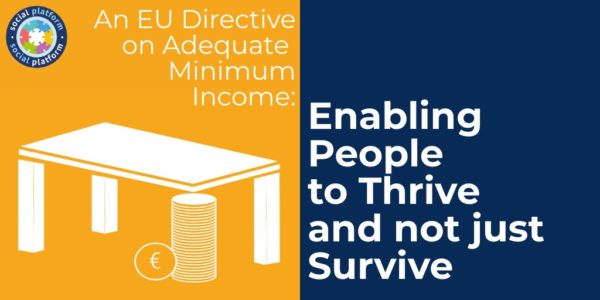Social Platform publishes position paper on an ‘EU Framework Directive on Adequate Minimum Income’

Today, all EU Member States provide some form of minimum income scheme. However, most fail to guarantee the individuals concerned a decent standard of living throughout their life cycle.
This is why Social Platform and its member organisations call for an EU Framework Directive on Adequate Minimum Income. A legally binding directive would lay the foundation for a basic social safety net, which will allow everyone to live a life of dignity alongside contributing to the reduction of poverty and social exclusion – through fostering an upward social convergence within and across Member States. At the same time, this Framework Directive would mitigate the immediate and long-term socio-economic impacts of the COVID-19 pandemic.
Europe is one of the most prosperous regions in the world. From a global perspective, people living in the European Union enjoy some of the best living and working conditions and the most comprehensive social protection systems. Taking it outside the global context, the situation looks different. In 2018, more than 109 million people in the EU were living at risk of poverty and social exclusion. This amounts to 21.7% of the population – approximately one in five people. Moreover, certain groups are disproportionately affected by the prevalence of poverty and social exclusion (see Annex 1 of the position paper).
Adequate minimum income plays a key role in reducing the depth of poverty and persisting inequalities in different areas of life. It forms the basis on which comprehensive, high-quality and universal social protection systems should be built and is key to enabling inclusion and full participation in society.
With the recent COVID-19 outbreak, the EU is facing an unprecedented challenge and as with most crises, people in the most vulnerable situations are hit the hardest. The full magnitude of the pandemic’s socio-economic consequences will present themselves in the years to come. At the same time, social protection systems differ greatly from one EU Member State to another, and so does their capacity to cope with a crisis like this. Coordinated EU action is now more crucial than ever to prevent further social polarisation and poverty within the European Union.












































